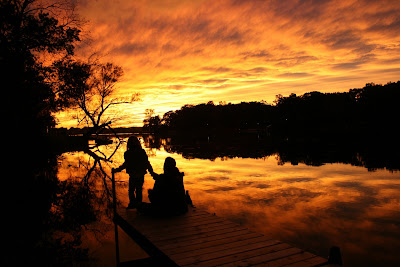
Could you imagine me trying to write a live drama where I attempt to recreate this moment?Lauren and I stand on the black stage with a bright spot light in our faces and huge images behind us of closeups on our faces? I tell Lauren about God painting the sky just like He did when he painted her face when she was still in my "tummy" (She's too young to know about the uterus, work with me here). But without the visual of this breathtaking sunset, it would be hard for the audience to really tune in a "get" the beauty of the moment and the lesson we both learned that night. Thus, I am thankful for the wonderful invention of still and video cameras.
Media is a great tool for our team. This chapter begins with the student complaining about performing in the "talkies" versus on the stage. This discussion is incredibly fitting since we are continually realizing that our media appearances are much more frequent than live. We are now noticing that we are only averaging one live drama to every five medias in a given series! This seems to make sense since we have these ginormous, mutant screens, but as the student is realizing, there is a whole different type of acting required. See if you can't identify with any of her complaints, especially if you've experienced a late night video shoot . . .
"I waited for an hour and a half. We started. This time three lines from the big scene; three lines--that was all. After that again a wait of an hour . . . .machinery, electricity, lenses, microphone, furniture, that is all that counts. An actor? Who cares? Acting? A miserable accessory . . . How can you look for rare moments of beauty? . . . Even when you find them they are separated, disjointed, cut, uneven . . ." (p. 47-48)
Thankfully, Jeff and our media team usually do their best not to make us feel as jaded as she does, but it is still sometimes challenging when you don't feel like you know everything about the media as a whole. But the cool thing about having a great media team is that we don't need to. We just need to know what our character is trying to accomplish in the given moment and trust in the vision of the producers and editors. Just look at the beauty and hilarity that occurred with all the elements coming together for Office Safari!
Many of us love the rush of live drama and love the community of doing weekends together, but our tactics for reaching our target are shifting. And that's one of the things I love about our church! We don't keep doing things because we like them, we adapt things to make things more effective for bringing people to Christ! So if you've been reluctant to see media winning out over live, listen to Richie's powerful argument on p. 51-52:
It is the "instrument that gives to the theatre the precision and scientific serenity which all other arts have had; the instrument that demands of the actor to be as exact as the color scheme in painting, form in sculpture, string, wood, brass in music, mathematics in architecture, words in poetry . . . It is the preservation of the art of the actor--the art of the theatre . . . Do you realize that with the invention of spontaneous recording of the image, movement, and voice, consequently the personality and soul of an actor, the last missing link in the chain of the arts disappears, and the theatre is no more a passing affair, but an eternal record?"
QUESTION FOR YOU:
How do you feel about live vs. media acting? What differences have you noticed? List some pros and cons for both.
The student continues to argue about the "flow of the part" and how she can "build up an emotion" with all the stopping and starting. That's when he tells her about the structure of actions, which I also refer to as objectives. You use these actions and objectives to create a map of where your character goes in the scene. It's like mapquest. Your ultimate goal is the destination but you have many different smaller goals and actions you have to take to get you there. For instance, Julia's goal this past weekend was to figure out what to do about her friend Chelsey. But she did it in a hundred different ways that made it interesting.
Assignment: Before you perform your scenes and monologues on Nov. 26th, make a map for yourself on your script. What is your overall objective? (Stan calls it the "superobjective" and Richie calls it the "leading strain".) What different tactics can you attach to certain lines or moments that will help you achieve your goal?
More on Chapter three next week! Keep those comments coming!







